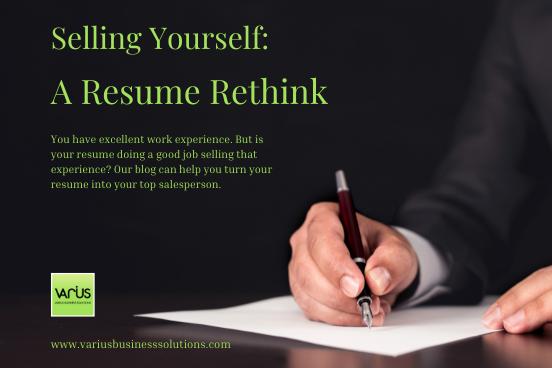
Selling Yourself: A Resume Rethink
There’s one thing that can make the difference between a good resume and a bad one, and can help you turn a good resume into a great one. It’s relatively simple, but it means thinking about your resume in a different way than you may be used to.
The shift is this: your resume should be a salesperson, not a biographer.
I’ll explain what this means for writing your resume in just a moment. But first – for those people who don’t work in sales – let me give you a quick lesson in sales theory. (If you do work in sales, keep reading, because the most challenging product to sell is yourself. This will help you do that.)
A salesperson can try to sell a product or service by focusing on its features or its benefits. In simple terms, features are the attributes of a product. The benefits are how it helps the buyer. In sales, it’s not either/or; features and benefits are both important. It’s just that the features are only important because they give the buyer the benefit they’re looking for.
Think about how you make decisions about a major purchase. When buying or renting a home, the layout and size of the rooms are important, but only because they allow you to live the life that you want in that home. You want to know the specs of the phone or tablet you’re buying, but only because they allow you to do the things you need and want to do with that device. You may look at the picture and sound quality specs of a big screen TV, but what you’re really thinking about is the quality of the movie-night experiences you’ll have with friends and family.
Too many people write their resumes like a spec sheet for one of these purchases. Your work experiences, the tasks you did, the responsibilities you’ve held in your jobs; those are your ‘features’. It’s not that they’re not important – they are. But only to the extent that they demonstrate the benefits you’ll bring to a prospective employer.
When writing or updating your resume, think like a salesperson. Your ‘customer’ is a potential employer. What are they really looking for? What value are they hoping to get from bringing on someone new? What benefit will they be looking for you to provide? The answers to these questions will depend on the kind of work you do, but generally speaking, they’re usually about improving the company somehow. Your resume should show that you can increase revenue for the company, or lower their costs, or make things run more smoothly and efficiently.
Every part of your resume can be viewed through that lens. When you describe a previous job, don’t just list all the things you did in that role. A resume that really sells you focuses on the aspects of your work that brought the most value to your previous employer and are of most relevance to your next employer. It should provide more detail about those, and less about things that are less directly related.
This shift to a sales mindset is also why keeping track of specific achievements, and including them on your resume, is so important. Accomplishments – particularly those that are quantifiable, shown in percentages and monetary amounts – underscore how you benefited your previous employers. This, in turn, helps your ‘customer’ – a prospective employer reading your resume – imagine how you’d benefit them. Summarize your skillset and accomplishments at the top of your resume so recruiters and employers are not searching through your document for what they need and want.
When you strip away the ‘features’, leaving the most valuable benefit-related content, you may end up with a resume that has fewer words and fewer pages. That’s fine: quality is what counts in a resume, not quantity. Decluttering is good, because the reader is left with the content that really shows what you can do for them.
So, does your resume read more like a biography? Think of it as a sales pitch instead, and make sure it sells you as well as your experience deserves.
www variusbusinesssolutions.com | info@variusbusinesssolutions.com